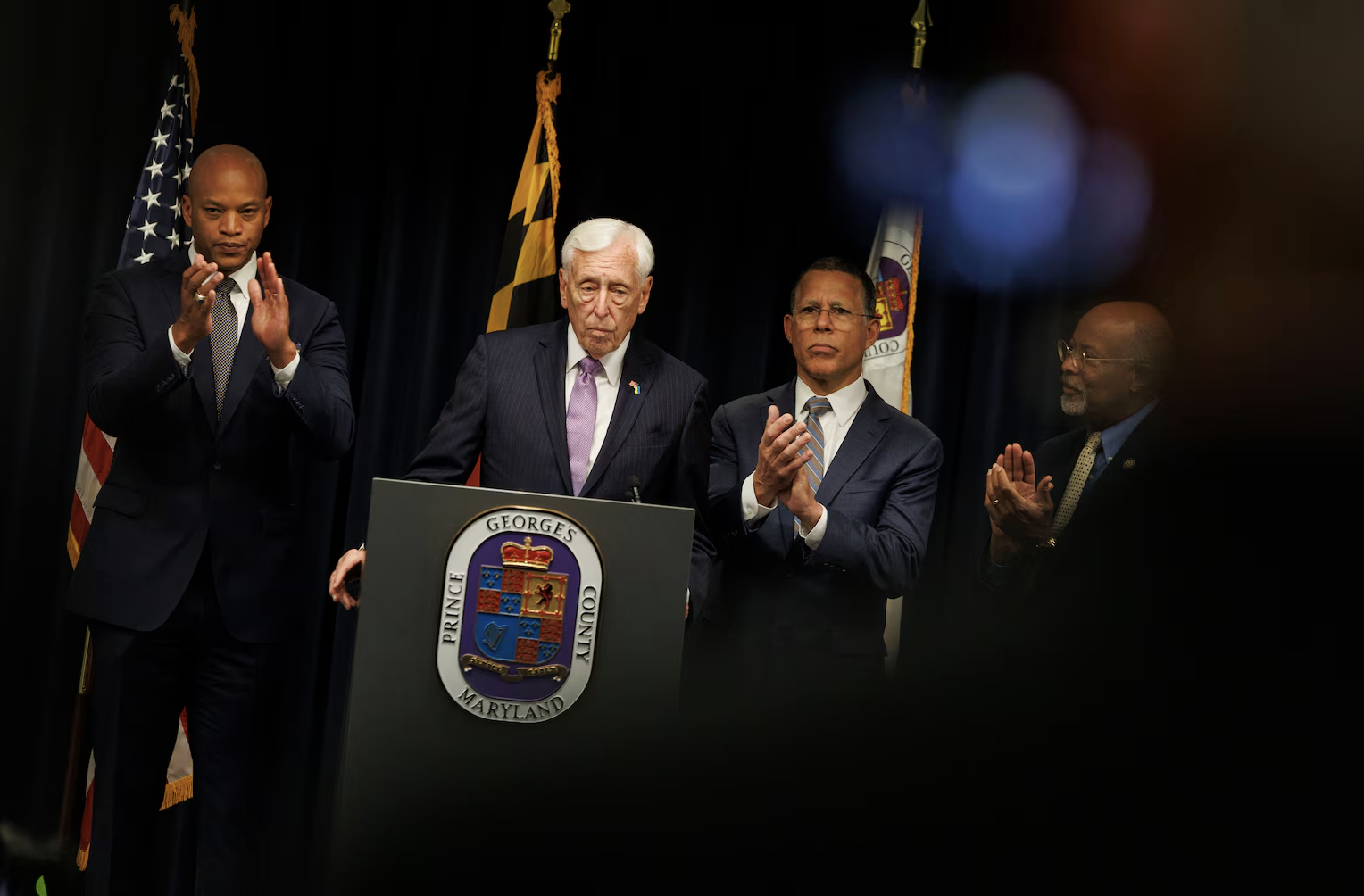Local
D.C. Office of Human Rights director steps down
Mayor Vincent Gray announced Gustavo Velasquez to become head of Latino advocacy group


D.C. Mayor Vincent Gray on Thursday announced Office of Human Rights Director Gustavo Velasquez’s resignation. (Washington Blade photo by Damien Salas)
Gray said in a statement that attorney Monica Palacio, director of the OHR’s Language Access Program, which helps city agencies provide translation services for people who speak languages other than English, will become interim director of the OHR beginning Nov. 3.
An OHR spokesperson told the Blade that Gray plans to submit Palacio’s nomination to become permanent director of the OHR to the City Council, which must confirm the nomination.
“Monica Palacio has spent her career advocating for civil and human rights, and she will undoubtedly use that experience and her legal background to ensure that OHR continues to fulfill its mission to address and prevent discrimination in the District,” Gray said in his statement.
The OHR, among other things, is charged with enforcing the city’s comprehensive Human Rights Act, which bans discrimination based on a wide of categories, including sexual orientation and gender identity as well as race, religion, gender, and ethnicity.
It’s portfolio expanded last year to include enforcement of an anti-bullying law passed by the D.C. Council and signed by Gray that LGBT rights advocates had long called on the Council to pass. Gray assigned Velasquez to take the lead in working with a special commission the mayor appointed to draft regulations to implement the law.
“The District has been extremely fortunate to have Director Velasquez at the helm of OHR for nearly seven years,” Gray said. “Under his leadership, the agency has dramatically reduced the length of time it takes to investigate complaints of discrimination, and he has pushed OHR toward a more proactive role in preventing discrimination before it occurs. Because of his work, we are a more just and welcoming District.”
Prior to her two-and-a-half year tenure at OHR, Palacio served as a member of the Commission on Human Rights, which adjudicates discrimination cases it receives from the OHR. Before that, she worked as senior consultant for the Management Assistance Group, which provides assistance to social justice organizations, and served as director of training and technical assistance for the National Crime Prevention Council, according to information released by the mayor’s office.
Elliot Imse, an OHR spokesperson who’s gay, called Palacio a strong and committed LGBT community ally who has worked on LGBT related issues in the past.
According to Imse, she was “instrumental” in the formation of a gay-straight alliance group at a local high school and has conducted several youth leadership development training sessions for the local LGBT youth services and advocacy group SMYAL.
The announcement from the mayor’s office says Velasquez will become executive director of the Latino Economic Development Center. The center’s website says the organization’s mission is to “drive the economic and social advancement of low to moderate income Latinos and other D.C. area residents by equipping them with the skills and tool to achieve financial independence and become leaders in their communities.”
Virginia
Gay Va. State Sen. Ebbin resigns for role in Spanberger administration
Veteran lawmaker will step down in February

Alexandria Democrat Adam Ebbin, who has served as an openly gay member of the Virginia Legislature since 2004, announced on Jan. 7 that he is resigning from his seat in the State Senate to take a job in the administration of Gov.-Elect Abigail Spanberger.
Since 2012, Ebbin has been a member of the Virginia Senate for the 39th District representing parts of Alexandria, Arlington, and Fairfax counties. He served in the Virginia House of Delegates representing Alexandria from 2004 to 2012, becoming the state’s first out gay lawmaker.
His announcement says he submitted his resignation from his Senate position effective Feb. 18 to join the Spanberger administration as a senior adviser at the Virginia Cannabis Control Authority.
“I’m grateful to have the benefit of Senator Ebbin’s policy expertise continuing to serve the people of Virginia, and I look forward to working with him to prioritize public safety and public health,” Spanberger said in Ebbin’s announcement statement.
She was referring to the lead role Ebbin has played in the Virginia Legislature’s approval in 2020 of legislation decriminalizing marijuana and the subsequent approval in 2021of a bill legalizing recreational use and possession of marijuana for adults 21 years of age and older. But the Virginia Legislature has yet to pass legislation facilitating the retail sale of marijuana for recreational use and limits sales to purchases at licensed medical marijuana dispensaries.
“I share Governor-elect Spanberger’s goal that adults 21 and over who choose to use cannabis, and those who use it for medical treatment, have access to a well-tested, accurately labeled product, free from contamination,” Ebbin said in his statement. “2026 is the year we will move cannabis sales off the street corner and behind the age-verified counter,” he said.
Maryland
Steny Hoyer, the longest-serving House Democrat, to retire from Congress
Md. congressman served for years in party leadership

By ASSOCIATED PRESS and LISA MASCARO | Rep. Steny Hoyer of Maryland, the longest-serving Democrat in Congress and once a rival to become House speaker, will announce Thursday he is set to retire at the end of his term.
Hoyer, who served for years in party leadership and helped steer Democrats through some of their most significant legislative victories, is set to deliver a House floor speech about his decision, according to a person familiar with the situation and granted anonymity to discuss it.
“Tune in,” Hoyer said on social media. He confirmed his retirement plans in an interview with the Washington Post.
The rest of this article can be found on the Baltimore Banner’s website.
District of Columbia
Kennedy Center renaming triggers backlash
Artists who cancel shows threatened; calls for funding boycott grow

Efforts to rename the Kennedy Center to add President Trump’s name to the D.C. arts institution continue to spark backlash.
A new petition from Qommittee , a national network of drag artists and allies led by survivors of hate crimes, calls on Kennedy Center donors to suspend funding to the center until “artistic independence is restored, and to redirect support to banned or censored artists.”
“While Trump won’t back down, the donors who contribute nearly $100 million annually to the Kennedy Center can afford to take a stand,” the petition reads. “Money talks. When donors fund censorship, they don’t just harm one institution – they tell marginalized communities their stories don’t deserve to be told.”
The petition can be found here.
Meanwhile, a decision by several prominent musicians and jazz performers to cancel their shows at the recently renamed Trump-Kennedy Center in D.C. planned for Christmas Eve and New Year’s Eve has drawn the ire of the Center’s president, Richard Grenell.
Grenell, a gay supporter of President Donald Trump who served as U.S. ambassador to Germany during Trump’s first term as president, was named Kennedy Center president last year by its board of directors that had been appointed by Trump.
Last month the board voted to change the official name of the center from the John F. Kennedy Memorial Center For The Performing Arts to the Donald J. Trump And The John F. Kennedy Memorial Center For The Performing Arts. The revised name has been installed on the outside wall of the center’s building but is not official because any name change would require congressional action.
According to a report by the New York Times, Grenell informed jazz musician Chuck Redd, who cancelled a 2025 Christmas Eve concert that he has hosted at the Kennedy Center for nearly 20 years in response to the name change, that Grenell planned to arrange for the center to file a lawsuit against him for the cancellation.
“Your decision to withdraw at the last moment — explicitly in response to the Center’s recent renaming, which honors President Trump’s extraordinary efforts to save this national treasure — is classic intolerance and very costly to a non-profit arts institution,” the Times quoted Grenell as saying in a letter to Redd.
“This is your official notice that we will seek $1 million in damages from you for this political stunt,” the Times quoted Grenell’s letter as saying.
A spokesperson for the Trump-Kennedy Center did not immediately respond to an inquiry from the Washington Blade asking if the center still planned to file that lawsuit and whether it planned to file suits against some of the other musicians who recently cancelled their performances following the name change.
In a follow-up story published on Dec. 29, the New York Times reported that a prominent jazz ensemble and a New York dance company had canceled performances scheduled to take place on New Year’s Eve at the Kennedy Center.
The Times reported the jazz ensemble called The Cookers did not give a reason for the cancellation in a statement it released, but its drummer, Billy Hart, told the Times the center’s name change “evidently” played a role in the decision to cancel the performance.
Grenell released a statement on Dec. 29 calling these and other performers who cancelled their shows “far left political activists” who he said had been booked by the Kennedy Center’s previous leadership.
“Boycotting the arts to show you support the arts is a form of derangement syndrome,” the Times quoted him as saying in his statement.
-

 Colombia5 days ago
Colombia5 days agoGay Venezuelan man who fled to Colombia uncertain about homeland’s future
-

 Arts & Entertainment5 days ago
Arts & Entertainment5 days ago2026 Most Eligible LGBTQ Singles nominations
-

 District of Columbia4 days ago
District of Columbia4 days agoKennedy Center renaming triggers backlash
-

 District of Columbia4 days ago
District of Columbia4 days agoNew interim D.C. police chief played lead role in security for WorldPride




















